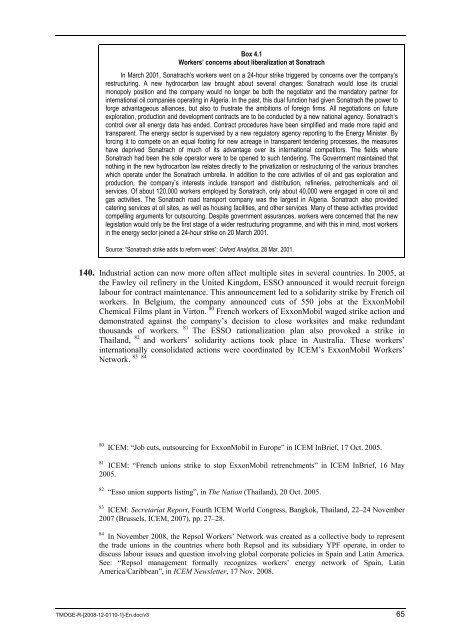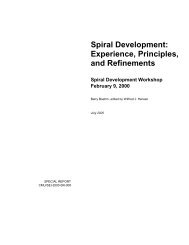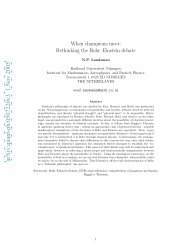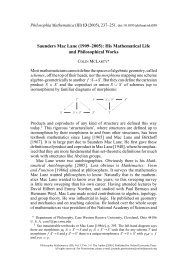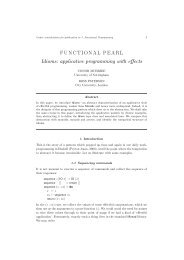wcms_161662
wcms_161662
wcms_161662
Create successful ePaper yourself
Turn your PDF publications into a flip-book with our unique Google optimized e-Paper software.
Box 4.1<br />
Workers’ concerns about liberalization at Sonatrach<br />
In March 2001, Sonatrach’s workers went on a 24-hour strike triggered by concerns over the company’s<br />
restructuring. A new hydrocarbon law brought about several changes: Sonatrach would lose its crucial<br />
monopoly position and the company would no longer be both the negotiator and the mandatory partner for<br />
international oil companies operating in Algeria. In the past, this dual function had given Sonatrach the power to<br />
forge advantageous alliances, but also to frustrate the ambitions of foreign firms. All negotiations on future<br />
exploration, production and development contracts are to be conducted by a new national agency. Sonatrach’s<br />
control over all energy data has ended. Contract procedures have been simplified and made more rapid and<br />
transparent. The energy sector is supervised by a new regulatory agency reporting to the Energy Minister. By<br />
forcing it to compete on an equal footing for new acreage in transparent tendering processes, the measures<br />
have deprived Sonatrach of much of its advantage over its international competitors. The fields where<br />
Sonatrach had been the sole operator were to be opened to such tendering. The Government maintained that<br />
nothing in the new hydrocarbon law relates directly to the privatization or restructuring of the various branches<br />
which operate under the Sonatrach umbrella. In addition to the core activities of oil and gas exploration and<br />
production, the company’s interests include transport and distribution, refineries, petrochemicals and oil<br />
services. Of about 120,000 workers employed by Sonatrach, only about 40,000 were engaged in core oil and<br />
gas activities. The Sonatrach road transport company was the largest in Algeria. Sonatrach also provided<br />
catering services at oil sites, as well as housing facilities, and other services. Many of these activities provided<br />
compelling arguments for outsourcing. Despite government assurances, workers were concerned that the new<br />
legislation would only be the first stage of a wider restructuring programme, and with this in mind, most workers<br />
in the energy sector joined a 24-hour strike on 20 March 2001.<br />
Source: “Sonatrach strike adds to reform woes”; Oxford Analytica, 28 Mar. 2001.<br />
140. Industrial action can now more often affect multiple sites in several countries. In 2005, at<br />
the Fawley oil refinery in the United Kingdom, ESSO announced it would recruit foreign<br />
labour for contract maintenance. This announcement led to a solidarity strike by French oil<br />
workers. In Belgium, the company announced cuts of 550 jobs at the ExxonMobil<br />
Chemical Films plant in Virton. 80 French workers of ExxonMobil waged strike action and<br />
demonstrated against the company’s decision to close worksites and make redundant<br />
thousands of workers. 81 The ESSO rationalization plan also provoked a strike in<br />
Thailand, 82 and workers’ solidarity actions took place in Australia. These workers’<br />
internationally consolidated actions were coordinated by ICEM’s ExxonMobil Workers’<br />
83 84<br />
Network.<br />
80 ICEM: “Job cuts, outsourcing for ExxonMobil in Europe” in ICEM InBrief, 17 Oct. 2005.<br />
81<br />
ICEM: “French unions strike to stop ExxonMobil retrenchments” in ICEM InBrief, 16 May<br />
2005.<br />
82 “Esso union supports listing”, in The Nation (Thailand), 20 Oct. 2005.<br />
83<br />
ICEM: Secretariat Report, Fourth ICEM World Congress, Bangkok, Thailand, 22–24 November<br />
2007 (Brussels, ICEM, 2007), pp. 27–28.<br />
84 In November 2008, the Repsol Workers’ Network was created as a collective body to represent<br />
the trade unions in the countries where both Repsol and its subsidiary YPF operate, in order to<br />
discuss labour issues and question involving global corporate policies in Spain and Latin America.<br />
See: “Repsol management formally recognizes workers’ energy network of Spain, Latin<br />
America/Caribbean”, in ICEM Newsletter, 17 Nov. 2008.<br />
TMOGE-R-[2008-12-0110-1]-En.doc/v3 65


